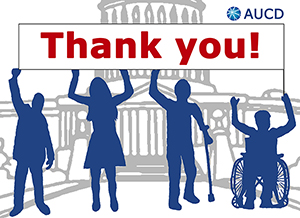We did it! Thank you! Update on Health Care Vote
July 28, 2017

|
As you all now know, early this morning the Senate rejected a significantly downsized proposal to repeal and overhaul portions of the Affordable Care Act. The vote was 49-51. As we shared yesterday, the bill would have dropped 15 million individuals from their current health coverage, created further instability in the individual market nationwide, and given states the tools to eliminate current policies that protect people with disabilities and others living with preexisting conditions.
Your sustained efforts, and those of your local partners - self-advocates, families, clinicians, advocacy organizations and others - have been heard! Thank you for your tireless support. Thank you for telling us what information you needed to be effective in defining and sharing the implications of the evolving legislation with policymakers at all levels of government. Despite its multiple iterations and amendments, every version of the bill would have adversely affected the disability community. Every version would have limited access to health care and to home and community based services. Every version would have undermined the promise of Olmstead. Every version would have been a dramatic and aggressive retreat from the current federal commitment to people with disabilities.
For any health reform proposal to be successful, especially one attempting to dramatically change nearly one-fifth of the nation's economy, it must include people with disabilities in the process. Members on both sides of the aisle have suggested a return to a more open and deliberative conversation to address parts of the Affordable Care Act. AUCD strongly supports this, and has consistently advocated for a more transparent and consultative approach. There is no crisis demanding immediate federal action.
But what will happen next is uncertain. Yes, this is an important victory, and we all should feel a sense of relief, but it is not the end of the debate. There are many things that can be done within federal agencies - especially at the Centers for Medicare and Medicaid Services (CMS) - that would threaten people with disabilities. These changes would require no congressional action to implement. CMS has significant current authority to provide flexibility to state Medicaid programs, for example. We'll continue to keep you updated on the latest developments. We'll ask for your help should our stakeholders be needed to achieve positive policy outcomes. We will also want to continue to hear from you about what is happening in your states and what you need to support your advocacy efforts.
Finally, please celebrate with your friends and colleagues today. Cutting and capping Medicaid, CBO scores, and entitlement reform are not just abstract concepts. The everyday lives of real people living with disabilities - and all who support them - are at the heart of these buzzwords. Thank you for understanding that and for championing these important issues within your centers and local communities.







